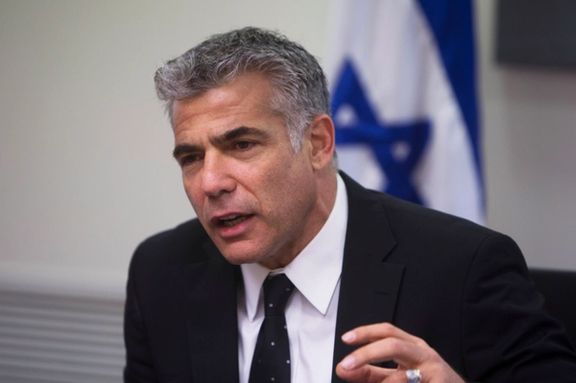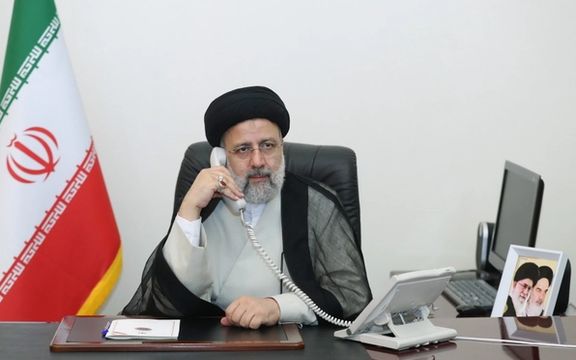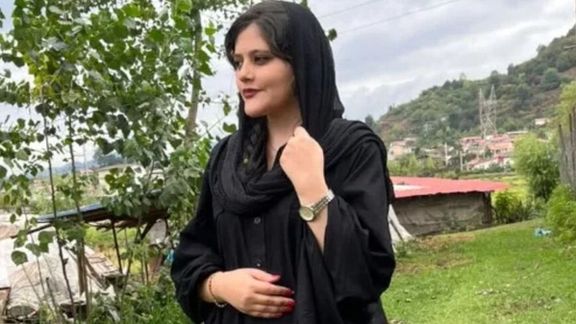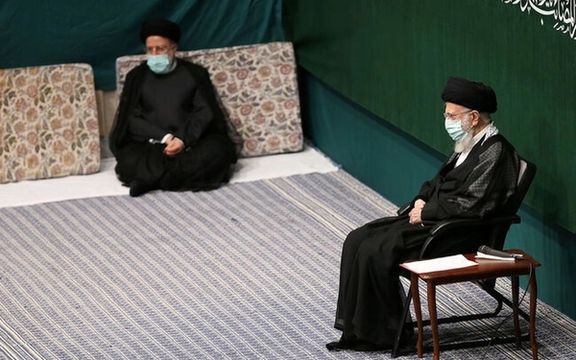US Talks With Iran Must Be Based On Credible Military Threat - Israel

Israeli Prime Minister Yair Lapid has emphasized the country’s right to attack Iran regardless of the US decisions and policies about the Islamic Republic.

Israeli Prime Minister Yair Lapid has emphasized the country’s right to attack Iran regardless of the US decisions and policies about the Islamic Republic.
According to Iran International’s correspondent, Lapid reiterated during the weekly cabinet meeting on Sunday that the US and Israel do not “necessarily agree on the need for a credible military threat against Iran at the present time.”
“We came and asked to introduce a credible military threat during President Biden’s [July] visit,” Lapid said, adding that “We want the basis [for world power’s negotiations with Iran] to be a credible military threat. We didn’t necessarily agree on this with the Americans.”
He noted that he “made it clear to the president and his team that Israel opposes the nuclear deal and maintains complete freedom to act, diplomatically and operationally, in the face of the Iranian nuclear program.”
Israel has recently announced that it will try until the very last moment to make the United States reject the nuclear deal.
Lapid had earlier said that Israel is leading “an intensive campaign” meant to prevent the signing of “a dangerous” nuclear deal between Iran and world powers but not to the point of rupture.
Earlier in the month, Mossad chief David Barnea said he shared "sensitive intelligence materials" with heads of CIA, FBI, Pentagon and other top officials to warn US against being cheated by the Islamic Republic’s lies.

Iran's President Ebrahim Raisi on Sunday had a phone conversation with the family of Mahsa Amini who died in the custody of the Islamic Republic's "morality" police.
"Your daughter and all Iranian girls are my own children, and my feeling about this incident is like losing one of my own dear ones," Raisi’s office quoted him as telling the Aminis, promising them to carefully deal with the "incident".
“I was informed of this incident when I was on a trip to Uzbekistan [to attend the latest Shanghai Cooperation Organization summit]. I immediately ordered my [administration] to investigate this as a special case,” he said, adding that “Rest assured will demand the relevant state bodies to follow up on this case until all its aspects come into light.”
The 22-year-old Mahsa Amini who was arrested on Tuesday by the morality police and was taken to hospital two hours later after losing consciousness. She passed away Friday afternoon at Kasra Hospital in Tehran from severe damage to her brain.
Hospital staff told Iran International that Amini received repeated blows to her head and was near death when she was brought in.
Numerous condemnations and protests are still following Amini’s death, with many state officials calling for the elimination of the hijab enforcement patrols.
Masoumeh Ebtekar, former President Hassan Rouhani's vice president for women and family affairs, said on Sunday that the previous administration tried to cancel the patrols, but hardliners in the country did not allow it.

A hashtag created in the name of a young woman who went into a coma and died following her arrest by Iran's police this week has passed the 1.6 million mark.
Originally from Saqqez in Kurdistan Province, the 22-year-old woman, Mahsa Amini, known as Zhina to family, collapsed at a detention center two hours after her arrest by a hijab enforcement patrol in Tehran. She passed away Friday afternoon at Kasra Hospital in northern Tehran due to severe brain injury.
A hospital source told Iran International Saturday evening that her brain tissue had been seriously damaged because of multiple blows to the head and there was no chance of surgery.
The hashtag’s popularity is only second to ‘Do Not Execute’ against the death penalty in 2020 which reached an staggering 10 million mark. the hashtag was first used to stop the execution of three young protesters in Iran.
Amini’s father speaking to Ham-Mihan newspaper denied various claims by Islamic Republic officials that his daughter’s death was caused by previous health conditions including epilepsy, hydrocephalus, and cardiovascular diseases.
Some women began cutting their hair as protest against forced hijab and posting the videos on social media.
According to Hengaw Human Rights Organization, a Kurdish rights group, the number of protesters wounded by security forces in Saqqez Saturday after the young woman’s burial has increased to thirty-three including a young man blinded by birdshots.
Iran’s exiled Prince Reza Pahlavi announced two days of public mourning in a statement, telling Iranians that they need to use their grief and anger to boost national solidarity against the Islamic Republic regime.
The former Crown Prince had issued a statement earlier calling the Islamic Republic “misogynistic” and asking Iranians to “stand up against this monstrosity.”
In July he had said that as long as Iranian women are not free, Iran will not be free, calling on men to be in the front lines in this struggle to support women in their struggle to reclaim their obvious and basic rights,” especially the freedom to choose what to wear.
Some Iranians consider Mr Pahlavi’s reaction inadequate in the circumstances and expect him to use his position which comes with some good degree of popularity to encourage action stronger than mere mourning.
“What is an announcement of two days of public mourning going to do for people mourning 24 hours a day, 365 days a year? It will be like pouring two cups of water in the sea. What are they supposed to do during the two days of mourning? Cry? Wail?” Arash Joudaki, essayist and philosophy professor in Belgium, tweeted Saturday, arguing that mourning decreases stamina for action against the regime. “Angry mourners must turn their grief and anger into a springboard for effective action!”
Joudaki replied to a comment from one of the supporters of the former Crown Prince who alleged he was “settling political scores” that he had no accounts to settle with the prince. Another Twitterati directly addressed Reza Pahlavi asking him why he has not been using public arenas to further the cause of the Iranian people. “Go lobby and make speeches at the UN. Aren’t allowed in the UN? Go make a speech in a university, or even in a cafe,” he wrote.
In a tweet Saturday, London-based journalist Pouria Zeraatisuggested that, if possible, businesses should go on strike, women should post their photos without hijab on social media, and people should put graffiti including Mahsa’s image and slogans against compulsory hijab on walls, and chant slogans on rooftops.
But as on previous occasions, the regime appears to be ready to crush protests using tens of thousands of anti-riot forces and armed civilian paramilitaries called the Basij. In nationwide protests in November 2019, these forces killed at least 1,500 unarmed protesters.

An official of Iran’s air travel services said on Sunday that the reason behind a lack of plane tickets is that more than half of the country’s aircraft are grounded.
Omid Khansari, a member of the board of directors of the southwestern province of Khuzestan’s Air Travel and Tourism Services, told ISNA that "Most of the planes owned by the airlines are grounded because they need parts and it is impossible to provide them due to the sanctions."
He added that only about 120 to 130 airplanes out of about 340 airplanes owned by the airlines are operational.
Confirming the same data, Alireza Pakfetrat, the representative of Shiraz in parliament, said in August that due to sanctions the quantity and quality of Iran's aviation industry are decreasing day by day, noting that the number of passenger planes that remain operational have decreased as well as the number of flights in the country.
Alireza Barkhor, the deputy chairman of the Association of Iranian Airlines, also said last year that more than 50 percent of passenger planes are not working due to lack of spare parts, particularly engines.
Iran has suffered from shortages of civilian airliners since the 1990s and used a variety of ways to lease older planes or buy spare parts through intermediaries, but the technical state of its fleet has been deteriorating.
The 2015 nuclear agreement (JCPOA) suspended sanctions on purchases of Western aircraft and Iran began talks to buy new planes from Boeing and Airbus. A few Airbus planes were delivered but the Trump administration never approved the sale of US planes until Washington withdrew from the JCPOA in May 2018.

At least 33 people, including several teenage girls, have been injured as security forces attacked people protesting the death of a young woman in the custody of hijab police.
According to the Hengaw Human Rights Organization, a Kurdish rights group, on Sunday an 18-year-old man lost one of his eyes after being hit with shot gun bird shots and four others have been transferred to a hospital in Tabriz because their conditions were so critical they could not be treated in Saqqez in Kurdistan province, the hometown of the victim.
The 22-year-old Mahsa Amini who was arrested on Tuesday by the morality police, was taken to hospital two hours later after losing consciousness. She passed away Friday afternoon at Kasra Hospital in Tehran for severe damage to her brain.
Hospital staff told Iran International that Amini received repeated blows to her head and was near death when she was brought in.
Protests are taking place in the provincial capital Sanandaj as well in several locations in Tehran since her death, with people chanting slogans against the authorities, including the Supreme Leader.
Iranian students at University of Tehran held a protest rally on Sunday, chanting “From Kurdistan to Tehran: The Entire Iran Covered in Blood.”
Fifteen Iranian activists who were going to hold a gathering outside the Parliament’s building in Tehran in protest at the death of Amini have also been arrested, while sporadic clashes are being reported from several cities across the country.

Iran’s Supreme Leader Ali Khamenei met with Ebrahim Raisi on Sunday, a day before the president is set to leave for the United States.
Khamenei wished success for Raisi on his forthcoming visit to New York to attend the 77th United Nations General Assembly.
Raisi also presented a report on the meetings and agreements he made during his recent visit to Uzbekistan for the 2022 Shanghai Cooperation Organization (SCO) summit, over which Khamenei also expressed content.
While the Biden administration is under mounting pressure to deny visa for the Iranian president, Raisi said he has no plans for either meeting or talking with his American counterpart Joe Biden, during his upcoming trip to New York.
"I do not think that such a meeting is going to take place," Raeisi told CBS News' 60 Minutes program during an interview conducted Tuesday, which the channel is going to broadcast in full on Sunday. When asked "Are you open to a meeting with President Biden? A face-to-face?" Raisi said, "I don't believe having a meeting or a talk with him will be beneficial."
"The new administration in the US, they claim that they are different from the Trump administration," he said, adding, "They have said it in their messages to us. But we haven't witnessed any changes in reality."
The US Senate is also preparing a bill to bar all officials tied to the Supreme Leader, and the proposed bill is likely to attract bipartisan support. A bipartisan group of 52 US representatives wrote a letter to the White House earlier this month calling on President Joe Biden to deny "entry visas" for Raisi and his delegation.